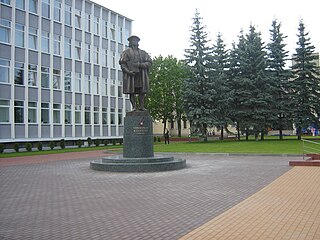 W
WAudrius Beinorius is a Lithuanian philosopher, orientalist, translator, Habilitated Doctor of Humane Letters.
 W
WVirgilijus Juozas Čepaitis is a Lithuanian publisher and translator, best known for his involvement in the Sąjūdis independence movement. He was the Executive Secretary of Sąjūdis and a member of its Initiative Group. He was also a signatory of the Declaration of the Restoration of Independence of Lithuania on March 11, 1990.
 W
WMikalojus Daukša was a Lithuanian and Latin religious writer, translator and a Catholic church official. He is best known as the first among Lithuania's humanists to underline the need to codify and promote the Lithuanian language over Chancery Ruthenian and Polish, which were in use in the Grand Duchy at the time. Daukša's Lithuanian translation of Jacob Ledesma's catechism became the first book in Lithuanian to be published in the Grand Duchy of Lithuania.
 W
WMotiejus Gustaitis was a Lithuanian Symbolist poet, who used numerous pseudonyms. He was also a translator and educator, as well as a Catholic priest. A long-term chairman of the Žiburys Society, Gustaitis worked to establish Lithuanian schools and advocated girls' education. He worked as principal of girls' pro-gymnasium in Marijampolė and coed gymnasium in Lazdijai.
 W
WLaurynas Ivinskis (1810-1881) was a Lithuanian teacher, publisher, translator and lexicographer, from a Samogitian noble family. He is notable for a series of annual calendars published between 1847 and 1877, in which he summarized the daily life of Samogitian peasantry. He also published literary works by some of the most renowned local authors. He was the first to publish Antanas Baranauskas' most famous work, Anyksčių Šilelis.
 W
WButkų Juzė was the pen name of Juozas Butkus, a Lithuanian educator, poet, playwright and journalist. He worked for numerous newspapers from 1910 onwards, including Aušrinė, Žemaitis, Lietuvos žinios, and Naujojoje Lietuvoje. In 1932 he was inducted into the Lithuanian Journalists' Union. He wrote the play Palaidūnas (Prodigal) in 1925, and translated numerous works into Lithuanian, including Goethe's Egmont. He later worked as a museum curator and teacher at the Klaipėda Pedagogical Institute.
 W
WAbraomas Kulvietis was a Lithuanian jurist and a professor at Königsberg Albertina University, as well as a reformer of the church.
 W
WPranas Mašiotas (1863–1940) was a Lithuanian activist and educator best known as children's writer and translator.
 W
WMiriam Markel-Mosessohn was a Russian author and translator who wrote in Hebrew.
 W
WKarolina Proniewska or Karolina Praniauskaitė (1828–1859) was a romantic Polish-Lithuanian poet and translator, of Samogitian extraction. Born in Samogitia, a historical region of Lithuania, then part of the Russian Empire, she is sometimes referred to as a Samogitian Bard.
 W
WAndrius Balys Tapinas is a Lithuanian journalist. Tapinas is the anchor of a long-running popular Lithuanian TV programme The Money Generation. The programme is now in its 11th season. He hosted the "Freedom Chain" from Vilnius to Belarus border during 2020 Belarusian protests.
 W
WTomas Venclova is a Lithuanian poet, prose writer, scholar, philologist and translator of literature. He is one of the five founding members of the Lithuanian Helsinki Group. In 1977, following his dissident activities, he was forced to emigrate and was deprived of his Soviet citizenship. Since 1980 he has taught Russian and Polish literature at Yale University. Considered a major figure in world literature, he has received many awards, including the Prize of Two Nations, and The Person of Tolerance of the Year Award from the Sugihara Foundation, among other honors.